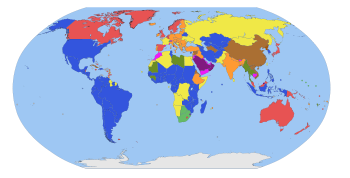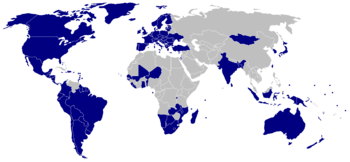
Form of government
Encyclopedia
A form of government, or form of state governance, refers to the set of political institutions by which a government
of a state
is organized. Synonyms include "regime type" and "system of government".
fields of comparative politics
and international relations
.
On the surface, identifying a form of government appears to be easy, as all governments has an official form. United States is a federal republic
while the former Soviet Union was a socialist republic. However self-identification is not objective, and as Kopstein and Lichbach argue, defining regimes can be tricky. For example, election
s are a defining characteristic of a democracy, but in practice elections in the former Soviet Union were not "free and fair" and took place in a single party state. Thus in many practical classifications it would not be considered democratic.
Another complication is that a huge number of political systems originate as socio-economic movements and are then carried into governments by specific parties
naming themselves after those movements. Experience with those movements in power, and the strong ties they may have to particular forms of government, can cause them to be considered as forms of government in themselves..


Government
Government refers to the legislators, administrators, and arbitrators in the administrative bureaucracy who control a state at a given time, and to the system of government by which they are organized...
of a state
State (polity)
A state is an organized political community, living under a government. States may be sovereign and may enjoy a monopoly on the legal initiation of force and are not dependent on, or subject to any other power or state. Many states are federated states which participate in a federal union...
is organized. Synonyms include "regime type" and "system of government".
Empirical and conceptual problems
In political science, it has long been a goal to create a typology or taxonomy of polities, as typologies of political systems are not obvious. It is especially important in the political sciencePolitical science
Political Science is a social science discipline concerned with the study of the state, government and politics. Aristotle defined it as the study of the state. It deals extensively with the theory and practice of politics, and the analysis of political systems and political behavior...
fields of comparative politics
Comparative politics
Comparative politics is a subfield of political science, characterized by an empirical approach based on the comparative method. Arend Lijphart argues that comparative politics does not have a substantive focus in itself, but rather a methodological one: it focuses on "the how but does not specify...
and international relations
International relations
International relations is the study of relationships between countries, including the roles of states, inter-governmental organizations , international nongovernmental organizations , non-governmental organizations and multinational corporations...
.
On the surface, identifying a form of government appears to be easy, as all governments has an official form. United States is a federal republic
Federal republic
A federal republic is a federation of states with a republican form of government. A federation is the central government. The states in a federation also maintain the federation...
while the former Soviet Union was a socialist republic. However self-identification is not objective, and as Kopstein and Lichbach argue, defining regimes can be tricky. For example, election
Election
An election is a formal decision-making process by which a population chooses an individual to hold public office. Elections have been the usual mechanism by which modern representative democracy operates since the 17th century. Elections may fill offices in the legislature, sometimes in the...
s are a defining characteristic of a democracy, but in practice elections in the former Soviet Union were not "free and fair" and took place in a single party state. Thus in many practical classifications it would not be considered democratic.
Another complication is that a huge number of political systems originate as socio-economic movements and are then carried into governments by specific parties
Political party
A political party is a political organization that typically seeks to influence government policy, usually by nominating their own candidates and trying to seat them in political office. Parties participate in electoral campaigns, educational outreach or protest actions...
naming themselves after those movements. Experience with those movements in power, and the strong ties they may have to particular forms of government, can cause them to be considered as forms of government in themselves..
Maps


See also
- CivicsCivicsCivics is the study of rights and duties of citizenship. In other words, it is the study of government with attention to the role of citizens ― as opposed to external factors ― in the operation and oversight of government....
- Comparative government
- List of countries by system of government
- List of forms of government
- List of European Union member states by political system
Further reading
- Bunce, Valerie. 2003. “Rethinking Recent Democratization: Lessons from the Postcommunist Experience.” World Politics 55(2):167-192.
- Dahl, Robert PolyarchyPolyarchyIn modern political science, the term polyarchy was introduced by Robert A. Dahl, now emeritus professor at Yale University, to describe a form of government in which power is vested in three or more persons. This form of government was first implemented in the United States and was gradually...
Yale University Press (1971) - Heritage, Andrew, Editor-in-Chief. 2000. World Desk Reference
- Linz, Juan. 2000. Totalitarian and Authoritarian Regimes. Boulder: Lynne Rienner.
- Linz, Juan, and Stepan, Alfred. 1996. Problems of Democratic Transition and Consolidation: Southernn Europe, South America, and Post-Communist Europe. Baltimore: Johns Hopkins Press.
- Lichbach, Mark and Alan Zukerman, eds. 1997. Comparative Politics: Rationality, Culture, and Structure, Cambridge: Cambridge University Press, 1997.
- Luebbert, Gregory M. 1987. “Social Foundations of Political Order in Interwar Europe,” World Politics 39, 4.
- Moore, Barrington, Jr. 1966. Social Origins of Dictatorship and Democracy: Lord and Peasant in the Making of the Modern World. Cambridge: Beacon Press, ch. 7-9.
- Comparative politics : interests, identities, and institutions in a changing global order/edited by Jeffrey Kopstein, Mark Lichbach, 2nd ed, Cambridge University Press, 2005.
- O’Donnell, Guillermo. 1970. Modernization and Bureaucratic-Authoritarianism. Berkeley: University of California.
- O’Donnell, Guillermo, Schmitter, Philippe C., and Whitehead, Laurence, eds., Transitions from Authoritarian Rule: comparative Perspectives. Baltimore: Johns Hopkins University Press.
- Przeworski, Adam. 1992. Democracy and the Market: Political and Economic Reforms in Eastern Europe and Latin America, New York: Cambridge University Press.
- Przeworski, Adam, Alvarez, Michael, Cheibub, Jose, and Limongi, Fernando. 2000. Democracy and Development: Political Institutions and Well Being in the World, 1950-1990. New York: Cambridge University Press.
- Shugart, Mathhew and John M. Carey, Presidents and Assemblies: Constitutional Design and Electoral Dynamics, New York, Cambridge Univ. Press, 1992.
- Taagepera, Rein and Matthew Shugart. 1989. Seats and votes: The effects and determinants of electoral systems, Yale Univ. Press.jimmy
External links
- Electronic interuniversity journal Federalism-e
- Types of Governments from Historical Atlas of the 20th Century
- Other classifications examples from Historical Atlas of the 20th Century
- http://stutzfamily.com/mrstutz/WorldAffairs/typesofgovt.html
- Regime Types

